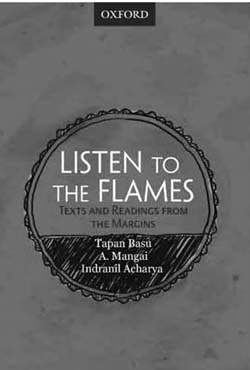The strife, the struggle and the anguish buried in the recesses of a Dalit’s psyche had to be understood in his own medium/language. The true victory is when they started writing their own history. Historically speaking, Dalit is a condition. The world experienced by the Dalit is altogether unrecognizable from the perspective of the present. It is time students as well as teachers—whether Dalit or non-Dalit— came face to face with the Dalit consciousness and the challenges they face as writers. For the first time ever an attempt to document Dalit ideology in the form of a textbook has resulted in the outstanding Listen to the Flames: Texts and Readings from the Margins. The book has been boldly crafted with the purpose of making graduate and undergraduate students understand the history of Dalit literature and also equip them with the tools of aesthetic apparatus and critical thinking required for its appreciation. It enlightens and introduces young scholars to concepts like class, caste, untouchablity and gender.
Listen To The Flames has an excellent line up of writers writing on a range of sensitive issues. Each poem, prose or short story is fore-grounded in the historical, social and political context. The detailed Introduction sets out the social, historical and political context of Dalit activism, writing and literature. The selections are eclectic in style, tone and of course content. As the reader goes through each poem or story he/she will encounter not only the resistance and resilience of the most marginalized section of Indian society, but will also ponder on the de-humanizing cultures that for centuries perpetrated injustice on the ‘other’. That Jayant Parmar speaks in a voice that is direct and immediate is noteworthy. It is clear that he is reaching out to an audience who is like him. In fact it is this embedded sense of a very different audience that is perhaps the key to understanding his work. In a sharply contrasting style is a frothy story ‘Undying Love’ by Sri Lakshman translated from Kannada by Susheela Punitha is about the problems confronted in love and marriage by a couple from a lower caste. Ironically, the situation gets worse when both belong to different rungs of the lower caste hierarchy. This extract from Lakshman’s life-story explicates the humiliations of such finer nuances of ‘othering’.

